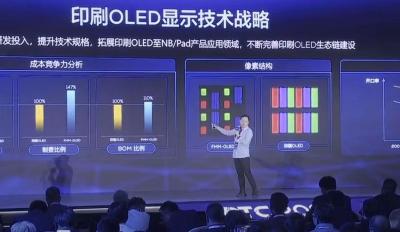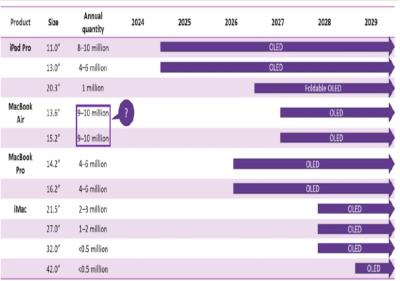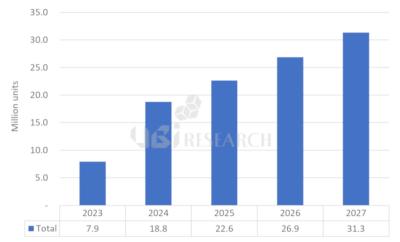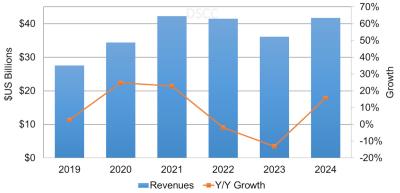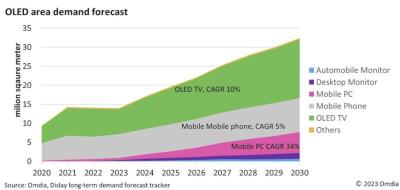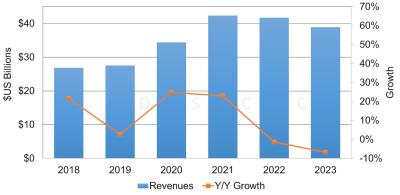OLED (Organic Light Emitting Diode) is a display technology that is brighter, more efficient, thinner and feature better refresh rates and contrast than an LCD display. OLEDs deliver the best picture quality ever and OLED displays have been used in smartphones, wearables and TVs.

Why are OLED displays better than LCDs?
- In OLED displays, each pixel emits light independently (in LCDs, there is a white backlight).
- The contrast ratio of OLEDs is much better than in LCD, so are the refresh rates and the viewing angles.
- OLEDs are thinner and lighter than LCDs, and can be made flexible, foldable, rollable and transparent.
- OLEDs are more efficient, as only lit pixels draw energy. A smart user interface can result in very power efficient OLED displays!
2019 - OLED laptops finally arrive
OLEDs are already very successful in smartphone displays (over 500 million panels produced annually, adopted in smartphones from Apple, Samsung, Sony and others), OLED TVs and wearables. While in early 2016 several laptop makers announced the first OLED laptops (such as the Lenovo X1 Yoga with its 14" 2550x1440 AMOLED and the HP Spectre X360 with its 13.3" 2560x1600 AMOLED display), these laptops were produced in small quantities and quickly discontinued.

In early 2019, Samsung finally announced it start mass producing OLED displays for laptops. Since then we have seen many laptops from HP, Dell, Asus, Gigabyte, Lenovo and others adopt OLED displays, first at premium models and slowly in medium-range laptops as well. Click here for our complete list of laptops with OLED displays. Samsung, and other display makers, are expanding OLED laptop production capacity as demand for IT in general is rising and consumers prefer OLED displays.
Image retention (burn-in)?
One of the major drawbacks of an OLED display is that because each pixel is driven independently and because the lifetime of an OLED emitter is limited, OLED panels suffer from image retention (known as burn-in). A much-used pixel is less bright than a pixel that hasn't been driven a lot (for a more technical explanation, click here).
In computer user interface this is a problem - as some UI elements are quite fixed (toolbars, icons, etc). There are some technologies to handle this problem - for example by measurement and compensation, by using a tandem architecture to extend lifetime, and more. The situation has improved much in recent years, to the point where OLEDs are very much suitable as laptops displays.
Further reading
The latest OLED Laptop news:
TCL CSoT reiterates plans to start producing inkjet printing OLEDs in 2024, to target IT displays
TCL CSoT says that it will start producing OLED displays using an inkjet printing process in the second half of 2024. This is excellent news and good to know CSoT is still on track for initial production in 2024. The company says it will first target the IT and medical sector.
The company says that the cost of producing OLEDs using its inkjet printed panels will be lower compared to the currently-used FMM based method, and its OLEDs will offer superior performance (in lifetime, mostly) as its process enables higher aperture.
BOE to build a $8.8 billion flexible IT AMOLED production line in Chengdu
Back in April 2022 it was reported that BOE started planning a 8.5-Gen IT AMOLED Line, to target the laptop and tablet markets. Following some delays, the company has now officially announced it plans and is set to start constructing the new fab.

Asus ZenBook 17 Fold OLED (BOE panel)
BOE says that it will invest 63 billion Yuan (over $8.8 billion USD) to build the new fab in Chengdu, Sichuan Province, China - where its first B7 6-Gen flexible AMOLED line is located as well. The new fab will use 2290x2620 glass substrates (which is usually referred to as 8.7-Gen) and will have a capacity of 32,000 monthly substrates. The fab will produce flexible and foldable AMOLEDs (on a polyimide substrate).
SGS awards Samsung's laptop OLED displays with its Green Mark for low levels of potential hazardous substrances
Evaluation services provider SGS has awarded Samsung Display's OLED laptop displays with its SGS Green Mark ECCS, HSA) following completion of a hazardous substance assessment.
SGS tested SDC's laptop OLEDs to precisely verify the presence of, and to quantify the volume of, over 300 hazardous substances of environmental concern which may be harmful to humans and the environment. This includes heavy metals, persistent organic pollutants and others. Samsung Display’s OLED panels performed well, achieving low levels, below the HSA testing threshold.
Apple's IT OLED roadmap supposedly leaks, detailing when the company plans to launch its OLED laptops, monitors and tablets
Accoridng to Twitter (X) user Revegnus, the following is a leaked Apple roadmap, detailing the company's plans for OLED laptops, tablets and monitors:
As many already estimate, Apple will release the first OLED tablets next year, the iPad Pro 11" and 13". The next stage will only arrive in 2026, when Apple will ship a foldable 20.3" tablet, and two OLED laptops (MacBook Pro 14.2" and 16.2").
UBI: The OLED IT panel market will grow at a CAGR of 41% to reach 31 million units by 2027
UBI Research estimates that 7.9 million AMOLED displays for IT applications (tablets, notebooks and monitors) will ship in 2023, growing to 31 million by 2027 (a CAGR of 41%). Apple's adoption of OLED screens starting in 2024 will fuel much of the demand.
OLED makers, led by Samsung, LG, BOE and Visionox are all expected to start producing IT OLED panels in existing 6-Gen production lines, and companies are also planning to construct new dedicated 8.5-Gen lines for IT applications.
LG Display starts producing 17" tandem foldable laptop OLED displays
LG Display announced that it has started to mass produce 17" 2560x1920 foldable OLED laptop displays. LGD applied a tandem stack architecture, to increase the lifetime of the OLED displays, to make it suitable for the demands of laptop use.
It is likely that the recently announced HP Spectre Foldable PC uses LG's new panels.
DSCC: the OLED market will decline 13% in 2023, growth to resume in 2024
DSCC estimates that OLED revenues in 2023 will be $36.1 billion - down 13% from last year. Just a few months ago DSCC's forecast for 2023 was $38.9 billion. This is the second year that the OLED market is contracting. In terms of shipments, there will be a 5% decrease in 2023. Looking forward to 2024, DSCC sees the market starting to recover, as demand for IT displays, TVs and smartphones will increase.
Looking at specific markets in 2023, DSCC says that OLED smartphone shipments will remain flat, but will drop 11% in revenues - as the demand for higher-end flexible displays is lower than in 2022. The only positive is the foldable display market, where shipments will increase 33% in 2023 compared to last year. 2023 also experiences a big drop in demand for OLED TVs - DSCC sees shipments declining 31% in 2023. The same goes for laptop OLEDs - a 32% decrease in sales in 2023.
Japan Display aims to start eLEAP laptop OLED production by 2025
Japan Display (JDI) plans to start producing medium-sized OLED displays, to be used in tablets and laptops. The company hopes to start producing the first panels (which will be around 14-inch in size) by 2025.

Asus ZenBook 17 Fold OLED (BOE panel)
Up until now, JDI focused on the production of wearable OLED displays, selling its panels for Apple's smartwatches since 2019. The company's production volume was limited, and so was its technology capabilities to increase production panel sizes. It will be interesting to see whether JDI hopes to also supply its future laptop/tablet panels to Apple.
Omdia: the OLED market by area will grow to over 30 million sqm in 2030
Market research firm Omdia says that according to its latest forecast, the OLED market will grow at a CAGR of 11% from 2022 to 2030, by total display production area.
The main OLED application is smartphone displays, and Omdia says that in 2022 the penetration of OLED displays into that market reached 42%. The market share of OLED smartphones will rise steadily in the future. The OLED TV market is experiencing a slowdown, but Omdia says it will resume growth in 2024.
DSCC: OLED panel revenues to decline in 2023, in a second consecutive year
DSCC says that OLED panel revenues will decline 7% in 2023 (to $38.9 billion), the second consecutive year that the OLED market is seeing a decline in sales. The largest declines will be in the OLED TVs and laptops segments.
The OLED smartphone market will actually grow 4% in unit sales, but revenues will decline 5%. The OLED TV market will decline 29% in 2023 in both revenues and units. OLED laptop unit sales will decline by 15%. All other segments, including AR/VR, automotive and tablets, will grow in sales and revenues in 2023.
Pagination
- Previous page
- Page 2
- Next page
